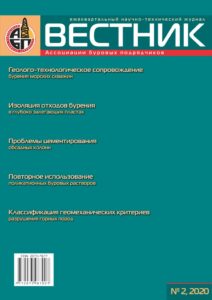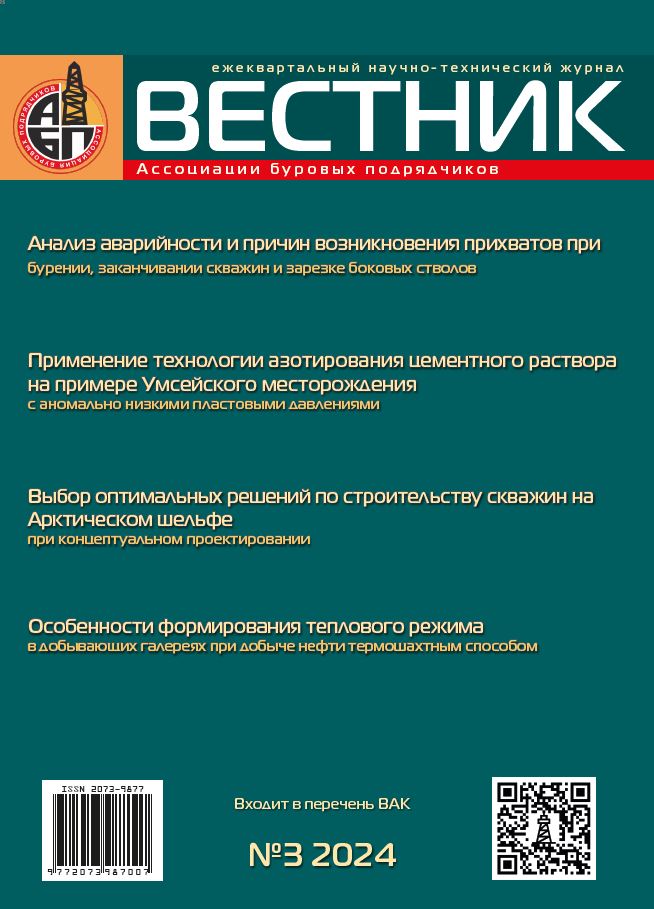STUDY OF OMK-1 REAGENT AS AN EFFECTIVE DRILLING FLUID BASE
Egorova E.V. – Candidate of Technical Sciences, Deputy Head of the Department of development and operation of oil and gas fields, Astrakhan State Technical University,
egorova_ev@list.ru egorova_ev@list.ru
Minchenko Yu.S. – Candidate of Technical Sciences, Associate professor of the Department of development and operation of oil and gas fields, Astrakhan State Technical University,
minchenko.yuliya@inbox.ru minchenko.yuliya@inbox.ru
Simonyants, Sergey L. – Dr.Tech.Sci., professor at the oil and gas drilling department of the Gubkin Russian State University of Oil and Gas, ssturbo@mail.ru ssturbo@mail.ru
УДК 622.185.76+622.257.122
Key words: drilling fluid, technological parameters, bench tests, inhibitory ability, swelling kinetics, organomineral colloid.
Improving the technical and economic indicators of drilling, including deep wells, to a great extent depends on the technical level of the used drilling fluids, their compliance with various mining and geological conditions. Increasing the depth of the wells and significantly complicating the geological and technical conditions for their drilling necessitates the use of high-quality drilling fluids with a low solids content.
The reagent market is saturated with offers, but from the point of view of selecting the most optimal and effective components, drilling fluids based on natural materials of organogenic origin are of particular interest.
The article presents the results of studies of the basic properties of OMK-1 reagent to assess the prospects of use as drilling fluids. Bench tests of the influence of a process fluid based on an organomineral colloid on the filtration-capacitive properties of a core material are described. The effect of drilling fluid on the inhibitory ability to clay material was studied.
It was revealed that drilling fluids based on OMK-1 reagent have a number of advantages: high-quality scarce clay is saved; pollution of productive formations and the environment is reduced; abrasive wear of the drilling tool is reduced; lubricating additives are not required; improved conditions for conducting geophysical surveys in the well.
STUDY OF OMK-1 REAGENT AS AN EFFECTIVE DRILLING FLUID BASE
Egorova E.V. – Candidate of Technical Sciences, Deputy Head of the Department of development and operation of oil and gas fields, Astrakhan State Technical University, egorova_ev@list.ru
Minchenko Yu.S. – Candidate of Technical Sciences, Associate professor of the Department of development and operation of oil and gas fields, Astrakhan State Technical University, minchenko.yuliya@inbox.ru
Simonyants S.L. – Doctor of Technical Sciences, Professor, Department of Oil and Gas Well Drilling, National University of Oil and Gas «Gubkin University», ssturbo@mail.ru
Key words: drilling fluid, technological parameters, bench tests, inhibitory ability, swelling kinetics, organomineral colloid.
Improving the technical and economic indicators of drilling, including deep wells, to a great extent depends on the technical level of the used drilling fluids, their compliance with various mining and geological conditions. Increasing the depth of the wells and significantly complicating the geological and technical conditions for their drilling necessitates the use of high-quality drilling fluids with a low solids content.
The reagent market is saturated with offers, but from the point of view of selecting the most optimal and effective components, drilling fluids based on natural materials of organogenic origin are of particular interest.
The article presents the results of studies of the basic properties of OMK-1 reagent to assess the prospects of use as drilling fluids. Bench tests of the influence of a process fluid based on an organomineral colloid on the filtration-capacitive properties of a core material are described. The effect of drilling fluid on the inhibitory ability to clay material was studied.
It was revealed that drilling fluids based on OMK-1 reagent have a number of advantages: high-quality scarce clay is saved; pollution of productive formations and the environment is reduced; abrasive wear of the drilling tool is reduced; lubricating additives are not required; improved conditions for conducting geophysical surveys in the well.


